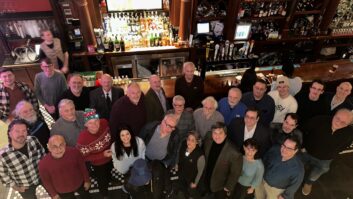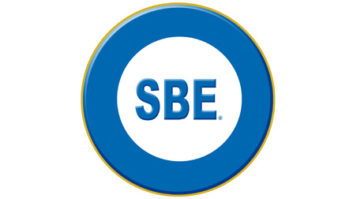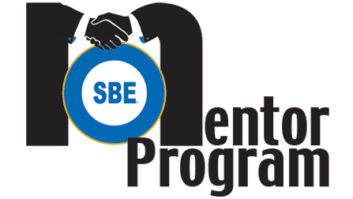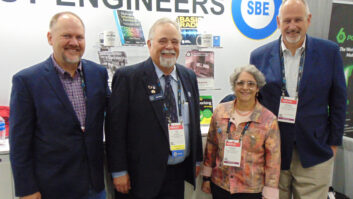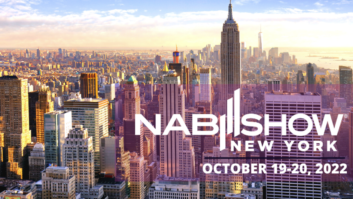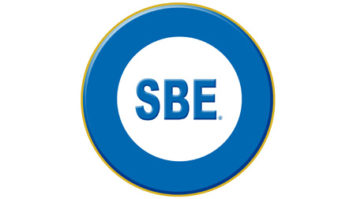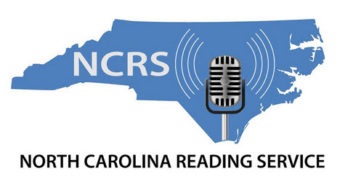 Since 1983, the North Carolina Reading Service has been bridging the reading gap for blind and print-impaired listeners, by providing live/recorded spoken-word news, weather, grocery store listings, obituaries and magazine articles to their homes and workplaces.
Since 1983, the North Carolina Reading Service has been bridging the reading gap for blind and print-impaired listeners, by providing live/recorded spoken-word news, weather, grocery store listings, obituaries and magazine articles to their homes and workplaces.
NCRS (formerly called the Triangle Radio Reading Service) can be heard 24/7 over the web, live and podcasts and on Alexa-enabled devices; on cable FM and TV channels in Raleigh; and on SCA receivers tuned to a subcarrier of WUNC(FM) 91.5 FM, North Carolina Public Radio.
For listeners beyond the immediate Raleigh/Durham area, MicroSpace Communications provides NCRS satellite coverage to reach all of North Carolina. The reading/audio production is done by approximately 150 volunteers at NCRS’ three-studio complex in an office park in midtown Raleigh.
Until recently, NCRS’ audio production equipment was as old as the complex itself, and in dire need of replacement. Not only was its mix of analog mixers, reel-to-reel and cassette recorders dated — along with its ancient version of AudioVault automation software — but the entire infrastructure was worn out; so much so, that the complex simply failed during December 2017.
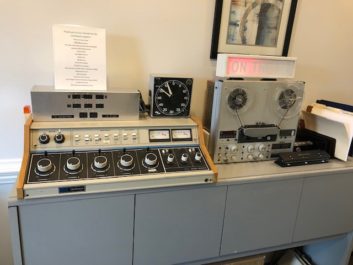
“It was three or four days before Christmas,” said NCRS Executive Director May Tran. “The whole system just decided to take a break.”
NCRS’ adept engineers managed to patch the system back together after this breakdown, but more than Band-Aids were needed to keep this vital service running.
Volunteer members of the Society of Broadcast Engineers Chapter 93 stepped in to give NCRS a much-needed technical makeover.
REPRIEVE
Retired electronics executive and long-time amateur radio operator Darrell Gordon (W4CX since 1968) had helped relaunch Chapter 93 in Raleigh, which had lapsed for a number of years. Elected as chapter chairperson, Gordon was looking for a public service project that would energize the engineers who had joined the group.
Gordon was a volunteer at NCRS, and it didn’t take long for him to suggest a “studio refresh.”
“I didn’t really know what I was doing, but it just made sense to me to come up with a common project that we would all get behind,” said Gordon. “So I brought up the notion of updating one of NCRS’ three studios, with our members providing the expertise and labor at no charge; and they all got on board.”
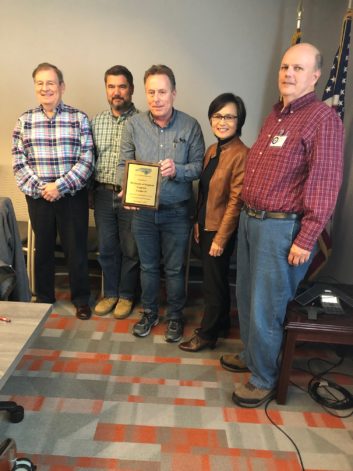
To make this project happen, several Chapter 93 members and others formed a committee to handle the project. Pitching in were Allen Sherrill, Keith Harrison, Dan Lane, Ric Goldstein, Bob Schule and Richard Pascal.
Over a 10-month period, the committee came up with an engineering plan to bring NCRS into the 21st century. Its equipment list included audio over IP eight-channel mixing boards as well as computer-based automation and networking.
“Originally, we had only planned to do one studio,” said Gordon. “But when we were about 75 percent done, our members decided that we should do all three, since we now had real momentum. So we did.”
Chapter 93’s members completely rewired the NCRS complex, and added advanced monitoring, studio switching and UPS power backups. The final product was really NCRS 2.0, because the complex is vastly superior to its pre-2018 version.
WHAT THEY INSTALLED
Chapter 93 member Ric Goldstein, based in Apex, N.C., is also an account manager with SCMS Inc, a long-established supplier of broadcast equipment. Working with Gordon and his committee’s recommendations, and supported by a company that Goldstein says believes in public service, he was able to provide NCRS’ new production equipment at significantly reduced prices.
“Keith and Allen installed PR&E DMX Digital Consoles with engines in all studios,” said Goldstein.
Each of these boards comes with eight faders and is networked to NCRS’s brand-new AudioVault Flex Recording/Playout System. They also installed Wheatstone four-channel DSP-based Blade-3 voice processors, dbx/Orban audio processors and AoIP codecs made by Barix and Comrex. Also added were Tascam CD-200BT CD players for music; Samson Servo 120 power amplifiers; Cisco switches, routers and patch bays; and surge protectors and UPSes made by Tripplite.
As for NCRS’ legacy production equipment? One set of it was installed in the complex’s lobby, to remind people how things used to be done (without putting them through the pain of actually doing it this way). The rest was mercifully taken away.
MAKING A DIFFERENCE
Moving to the AoIP production infrastructure has made a big difference to NCRS. “We can do things much quicker, do more things like podcasts that we could never do before, without dealing with failures,” said Tran. “Things go much smoother now, thanks to SBE Chapter 93 and their rebuild.”
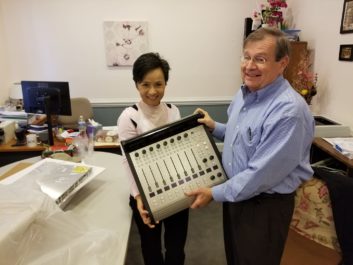
chairman, hold the new control surface.
Moving from analog tape to digital production brought its challenges. “Our readers are all volunteers and they know nothing about broadcast equipment,” said Gordon. “So we had to train them to get them comfortable with the new system, which they now are.”
The generosity of SBE Chapter 93’s members has made a real difference to the 150-plus volunteers who keep NCRS running around the clock. In recognition of their efforts, the chapter was honored in the fall at the NCRS Gala dinner, meeting under the theme “Black and White and Read Across North Carolina.”
“Thank you, thank you, and thank you to SBE Chapter 93 for your time, dedication and expertise,” said May Tran to the gala’s assembled guests. “Everything is possible at NCRS because of our wonderful SBE volunteers.”





